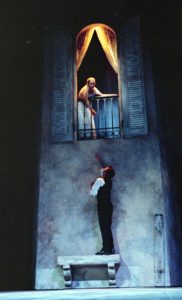
© cdn2.rsc.org.uk
Love has been an unfailing interest of mankind and an indispensable element of human lives. Love is much more than superficial attraction: at its best, love displays trust, commitment, longing, making sacrifices for the greater good. Yet on the flip side, it contains betrayal, grief and frustration. Throughout the centuries, countless artists have taken inspiration from love, leading to the genesis of arguably the most glorious and splendid artworks – be them paintings or musical compositions.
I want to introduce to you three beautiful pieces inspired by or associated with love, which in my opinion combine to form a full-embodied representation of consummate love.
Reminiscent of the viewing of a starry sky evoking memories of your beloved, this gorgeous Nocturne by Polish composer Ignacy Jan Paderewski (who also happened to be a former Prime Minister of Poland) is lyrical, gentle and soothing. With a rather simplistic and tranquil beginning, this miniature has a sighing motif throughout, conveying a sense of remembrance. Despite the fact that the composer did not explicitly state where he got the inspiration, the tender love embedded in the music is palpable – and you, as the listener, have the luxury to experience it yourself.
Intimate and elegant, the third piece from Fauré’s Romances sans paroles (Songs without words) Op.17 is set in a swaying motion with lush harmonies. This piece, I feel, portrays more the romantic side of a love relationship – like, sharing some private time with your loved one, revealing your deepest feelings and showing affection for each other. This composition reminds me of the following lines from William Shakespeare’s well-known Sonnet 18:
Shall I compare thee to a summer’s day?
Thou art more lovely and more temperate:
Rough winds do shake the darling buds of May,
And summer’s lease hath all too short a date:
Sometime too hot the eye of heaven shines,
And often is his gold complexion dimm’d;
And every fair from fair sometime declines,
By chance or nature’s changing course untrimm’d;
But thy eternal summer shall not fade
Nor lose possession of that fair thou owest;
Nor shall Death brag thou wander’st in his shade,
When in eternal lines to time thou growest:
So long as men can breathe or eyes can see,
So long lives this, and this gives life to thee.
Showing a coruscating kaleidoscope of tonal colours and full of technical bravura, Czech composer Josef Suk’s Píseň lásky (Song of Love) captures the passion and drama in love. As the music reaches its rapturous climax, an incandescent glow of colours is produced, elevating the emotional intensity to its apex – indicative of a declaration of love and a promulgation of promises. After all the outpouring of that strong, passionate love, the music quiets down and is brought to a serene conclusion.
I believe each of these three pieces signifies different elements of love; and together, they form an amalgam, expressed via a universal language across humanity – music. Music, whilst capable of expressing the strongest feeling of love, can also be inspired by love.
Love, as Victor Hugo immaculately described in Les Misérables, is “incorruptible, indivisible, imperishable”; “It is a point of fire that exists within us, which is immortal and infinite, which nothing can confine, and which nothing can extinguish”. Love remains one of the biggest mysteries, and the felicity that it brings remains ineffable. Scientists may reduce love into several neurotransmitters in action; but even as a medical student, I still believe love is something intangible, something so indescribably magnificent.
You are cordially invited to listen to these exquisite pieces and witness how composers distilled the complex and unspeakable qualities of love into such timeless gems.
May I end the article by quoting this famous declaration of love:
My bounty is as boundless as the sea,
My love as deep; the more I give to thee,
The more I have, for both are infinite.
From Romeo and Juliet, Act II Scene 2, by William Shakespeare

How underrated these pieces are! Beautiful music accompanied with beautiful writing!
Have never heard the Paderewski piece before… very romantic